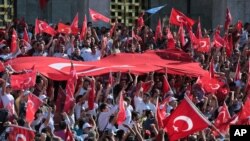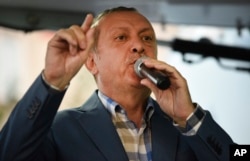With anti-American sentiment seemingly running high in Turkey in the aftermath of a foiled coup attempt, the U.S. is calling on Turkish political leaders and all sides to exercise restraint from “fiery rhetoric,” while expressing confidence that ongoing military cooperation between Washington and Ankara will continue.
“We are not concerned about our ongoing cooperation with Turkish security forces, especially within the anti-ISIL coalition,” State Department spokesman Mark Toner said Monday, using an acronym for Islamic State.
There are concerns that what have developed into fairly strong ties between the U.S. and Turkish militaries will begin to fray, especially since some Turkish officials already have accused the U.S. of providing some support to the alleged coup plotter — allegations U.S. officials have denied.
“It's not unexpected that you're going to hear fiery rhetoric, passionate rhetoric and not just from the political leadership, but on all sides,” Toner said, “we would caution against rhetoric that escalates tensions, and rather support de-escalation.”
While Turkish officials are expected to attend a conference in Washington later this week on the U.S.-led coalition’s fight against Islamic State militants, the failed coup and the ensuing purge of the military and judiciary is putting a strain on Turkey’s military ties with the U.S. and with NATO.
U.S. forces have been flying air sorties against the Islamic State terror group out of Incirlik Air Base and has about 3,000 military and civilian personnel based in Turkey, while NATO has a Spanish air defense unit stationed near Incirlik, in the town of Adana, and an Italian air defense battery in Kahramanmaras.
Anti-IS fight
Pentagon Press Secretary Peter Cook said Monday the attempted coup came as a surprise and did have an impact on anti-IS operations.
“There was a period of time when we were not able to fly, when the Turkish air space was closed to military aircraft,” he told reporters. "That did affect our plans for the day. In some cases, we had to look for aircraft at other locations to conduct certain missions.”
The Pentagon has said the use of Incirlik has been critical in military operations to weaken IS, but that U.S. and coalition forces have the ability to adjust.
Accusations fly
Turkish President Recep Tayyip Erdogan has accused Fethullah Gulen, a reclusive cleric now living in Pennsylvania, of orchestrating the violence and demanded that Gulen be extradited. Washington said such a request has not been received.
“At this point we have not received an extradition request from the Turkish government as it relates to Mr. Gulen,” White House spokesman Josh Earnest said Monday. “If and when we receive a request, we will evaluate that request based on the extradition treaty that was signed by the U.S. and Turkey nearly 30 years ago.”
Gulen has denied any involvement in the failed coup, and has denied any knowledge of who might be responsible.
The U.S. has called on Erdogan to refrain from using Friday's failed military coup to grab even more power and curb democracy.
“The democratically elected Turkish government has a responsibility to exercise restraint, and certainly to be supportive of due process and the freedoms that are outlined in the Turkish Constitution, that include freedom of speech, freedom of the press, and freedom of assembly,” Earnest said.
The State Department issued a travel warning suggesting U.S. citizens reconsider travel to Turkey at this time, following an emergency message issued by the U.S. Embassy in Ankara after the July 15 coup attempt. Americans were warned of increased threats from terrorist groups through Turkey and to avoid travel to southeastern Turkey.
Jeff Seldin, VOA National Security Correspondent, contributed to this report.





